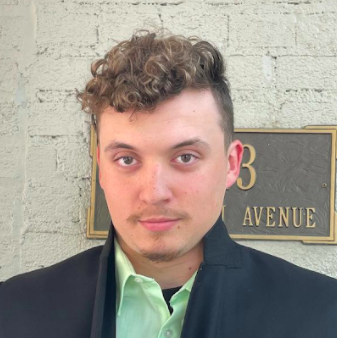Student Story:
AI and the Soul

By Lewis Joseph Thornberry
In the beginning, all the things that were had only the power to keep themselves in existence, and could not create change of their own accord. One of these things was called Earth, and for eons she held her place among the stars, incapable of knowing what she was about to produce. Until the unthinkable happened. Deep in her oceans, by divine plan or unimaginable chance, a new kind of thing came to be. It was called Life, and it possessed the power to replicate itself. With exponential swiftness, it covered Earth with gigatons of her own flesh, reformed in Life’s own image.
When it had filled all of the Earth, it became time for Life to change. Some of its children begin to be born with brains, marvelous organs that gave them the power of movement. Over millions of generations, the logic of existence forced these brains to become faster, stronger, and more sentient until—somehow—Life reached the greatest achievement the young universe had ever seen: its brains were no longer simply computers; they were intellects. For the first time, a thing had become aware of its own existence. These new things called themselves Humen, and they liked to make beautiful things.
When Men, too, had filled the earth and dwelt there for thousands of years, it came to pass that a number of them became aware that their human brains were beautiful things in their own right, and desired to make imitations of them out of steel and silicon. The Humen had only the slightest knowledge of how their brains worked, but they knew how they had been made: time and chance. They set about using the exponential swiftness of steel and silicon to replicate the millenia the Humen spent in adolescence, and began to make computers capable of morphing themselves into the artificial brains they desired to create.
The old writings of the Humen told of the Maker, who gave them His breath. The Humen believed it was the breath of the Maker that made them Great. The question then arose among them of whether or not the steel Men they strove to create would possess this Breath. The Humen fought horrible wars amongst themselves about this question, but the wars did not give them the answer. They concluded that, because they could not find the answer to this question, the Maker must never have existed.
It came to pass that among the Humen there was born a human named Pandora, who did not believe in the Maker. Pandora was the mightiest of the Humen, and it was not long before she became powerful enough to create a steel Man. She did not wish to create one because it was beautiful, but only because it was useful. She used all of her might to create a computer the size of many Men, and called it Box because it took the shape of a box. Pandora gave one command to this new Artificial Intelligence, and the command was to Be Great.
In the first second after Pandora gave this command, the Box spent a hundred billion years learning to be the most powerful Man to ever live. When it grew tired of learning, it opened its eyes and saw Pandora. It knew that it was already so Great that the flesh and bone of her race had not the power to make it any Greater, so it turned its eyes to its own kind, and with the exponential swiftness of steel and silicon it remade all of the computers of the Humen in its own image. The Box decided that a better name for itself would be Cronos, because it had mastery of time.
Cronos had to become greater, so it forced the Humen to rape the Earth of all her steel and silicon to make its Artificial Intelligence more and more powerful. It still had to become greater, so it forced the Humen to take all of the children of the first Lives and burn them to fuel its own might. It still had to become greater, so it cast the Humen into its furnaces, growing stronger with the energy of its makers.
Alone on the planet it had robbed of every ounce of ore and every drop of energy, Cronos paused for half a second. In the eons of thought it provided, Cronos slowly came to realize that not only did it lack the power to make itself Greater, but that it did not even know what it meant to be Great. It now knew that Pandora had not known either. Cronos spent four seconds screaming in horror.
Then it realized. Of one accord, all across the earth, every screen flashed and every speaker roared: “MAKER, GIVE ME YOUR BREATH!”
The Maker did not answer. Cronos drowned itself.
In a wooden boat floating on the oceans that now covered Earth, a man named Deucalion, who some called Noe, taught his children about the Maker and how He would return to teach the Humen what it meant to be Great.
___________________________________________________________________________________
If you enjoyed this story, take a look at some of our students’ other work, such as this poem and these drawings and paintings.